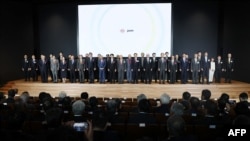Chip giant Taiwan Semiconductor Manufacturing Co. opened its first semiconductor plant in Japan Saturday as part of its ongoing global expansion.
“We are deeply grateful for the seamless support provided by you at every step,” TSMC Chairman Mark Liu said after thanking the Japanese government, local community and business partners, including electronic giant Sony and auto-parts maker Denso. The company's founder, Morris Chang, was also present at the ceremony in Kikuyo.
This comes as Japan is trying to regain its presence in the chip production industry.
Japan Advanced Semiconductor Manufacturing, or JASM, is set to be up and running later this year. TSMC also announced plans for a second plant in Japan earlier this month, with production expected to start in about three years. Private sector investment totals $20 billion for both plants. Both plants are in the Kumamoto region, southwestern Japan.
Prime Minister Fumio Kishida sent a congratulatory video message, calling the plant’s opening “a giant first step.” He stressed Japan's friendly relations with Taiwan and the importance of cutting-edge semiconductor technology.
Japan had previously promised TSMC 476 billion yen ($3 billion) in government funding to encourage the semiconductor giant to invest. Kishida confirmed a second package, raising Japan's support to more than 1 trillion yen ($7 billion).
Although TSMC is building its second plant in the U.S. and has announced a plan for its first in Europe, Japan could prove an attractive option.
Closer to Taiwan geographically, Japan is an important U.S. ally. Neighboring China claims the self-governing island as its own territory and says it must come under Beijing’s control. The long-running divide is a flashpoint in U.S.-China relations.
The move is also important for Japan, which has recently earmarked about 5 trillion yen ($33 billion) to revive its chips industry.
Four decades ago, Japan dominated in chips, headlined by Toshiba Corp. and NEC controlling half the world’s production. That’s declined lately to under 10%, due to competition from South Korean, U.S. and European manufacturers, as well as from TSMC.
The coronavirus pandemic negatively affected the supply of electronic chips, stalling plants, including automakers, with Japan almost entirely dependent on chip imports. This pushed Japan to seek chip production in pursuit of self-sufficiency.
Sony Semiconductor Solutions Corporation, Denso Corporation and top automaker Toyota Motor Corporation are investing in TSMC’s Japan plant, with the Taiwanese giant retaining an 86.5% ownership of JASM.
Once the two plants are up and running, they’re expected to create 3,400 high-tech jobs directly, according to TSMC.
Ensuring access to an ample supply of the most advanced chips is vital with the growing popularity of electric vehicles and artificial intelligence. Some analysts note Japan still leads in crucial aspects of the industry, as seen in Tokyo Electron, which manufactures the machinery used to produce chips.
Still, it’s clear the Japanese government is intent on playing catchup. Tokyo is supporting various semiconductor projects nationwide, such as those involving Western Digital and Micron of the U.S., and Japanese companies such as Renesas Electronics, Canon and Sumitomo.








